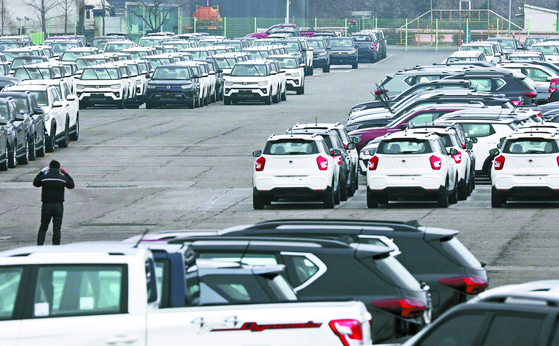
Ssangyong Motors is in crisis of legal management. The photo is Ssangyong Motor’s Pyeongtaek factory office in Pyeongtaek, Gyeonggi-do. News 1.
Ssangyong Motors has taken a step closer to corporate rehabilitation procedures (legal management). The short-term court management’P plan (pre-packaged plan)’ taken out as the last card was shaken. This is because Korea Development Bank, the main creditor bank, drew a line saying, “(Currently, Ssangyong Motor) is not at the stage of deciding whether to provide financial support for KDB.”
Sang-Hyun Choi, Senior Vice President of Industrial Bank of Korea, said at an online press conference held on the 2nd, “A potential investor left Korea on the 31st of last month without making a final decision on the P plan.” It is difficult to decide.” In addition, Vice President Choi added, “If it is difficult to proceed with the P plan due to the lack of validity of the business plan, the normal rehabilitation procedure is expected to be inevitable.”
The P Plan is a card taken out by Ssangyong Motor as a new breakthrough when negotiations for the sale of shares of Ssangyong Motor, which were discussed by India’s major shareholder Mahindra and US auto retailer HAAH Automotive, broke down. It is a restructuring method in which creditors inject new funds when the court quickly reduces the existing debt. Through the P plan, they planned to graduate from court officials in a short period of time, but they were unable to reach an agreement with creditors as well as new investors, and commercial vehicles were rushing to the edge of the cliff.
The KDB is in a position that additional support can be provided only when a rehabilitation plan with guaranteed future business feasibility is prepared. Attracting new investors is securing future business potential. However, as HAAH Automotive, known as a potential investor, withheld the investment decision, the KDB’s decision to support was also delayed.
Ahn Young-gyu, head of the industrial bank’s corporate finance division, said, “We know that potential investors have not made a decision (final decision) because Ssangyong Motor’s specific rehabilitation plan has not been prepared, so we have not sufficiently reviewed the progress of the P plan.” I said.

Ssangyong Motor’s deficit for 4 consecutive years. Graphic = Reporter Park Kyung-min [email protected]
The reason for the KDB’s additional support is that Ssangyong Motor has fallen into complete capital erosion. According to the Electronic Disclosure System of the Financial Supervisory Service, Ssangyong Motor’s sales amounted to 2.95 trillion won last year, down 18.6% from the previous year (3,623.8 billion won). The operating deficit was 4235 billion won, up 50% from the loss a year ago (281.9 billion won).
Net loss for the period was 4784 billion won, up 40% over the same period. The deficit accumulated for four consecutive years, and last year’s total capital was negative (-) 62.2 billion won. It means that even if Ssangyong Motors sells all its assets, it cannot pay off the debt. “We need a sustainable business plan,” said Ahn, saying, “It is not something that can be bought by simply putting money in a company with a cumulative deficit of over 1 trillion won over the past 10 years.”
However, if Ssangyong Motor goes bankrupt, a liability theory may arise that the Bank did not apply early. Regarding this, Ahn urged that the responsible role of the major shareholders is necessary, saying, “We believe that the cause of Ssangyong’s insolvency is due to the management failure of the major shareholder (Mahindra).” He drew the line again, saying, “If the contract for attracting new investments is broken, the major shareholders and Ssangyong Motors must come up with a plan to normalize their management.”
Reporter Yeom Ji-hyun [email protected]
